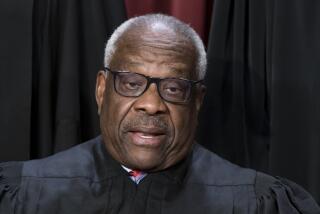Justices raise concerns about Defense of Marriage Act defense
- Share via
WASHINGTON -- A lawyer defending the federal law that denies benefits to legally married same-sex couples faced skeptical questions from key Supreme Court justices, who suggested the law wrongly discriminated against gays and improperly intruded into the right of states to define marriage.
Paul Clement, the former solicitor general who was defending the 1996 Defense of Marriage Act on behalf of the Republican leadership of the House of Representatives, told the justices in Wednesday’s argument that the law made only a “narrow” technical point, defining marriage for the purposes of federal law. But a majority of the justices indicated doubts about his attempt to minimize the law’s consequences.
Marriage affects “every aspect of life,” said Justice Ruth Bader Ginsburg. For the federal government to say that some legally married couples deserve benefits and others don’t “diminishes what the state says is marriage.” Couples would be left with “full marriage” on the one hand and “skim-milk marriage,” on the other, she said.
PHOTOS: Supreme Court considers gay marriage
Justice Anthony M. Kennedy, who is widely seen as the swing vote in the case, also challenged Clement on that point, noting that in defining marriage, the law affected benefits under roughly 1,100 federal statutes.
In doing so, he said, the federal government was putting itself in conflict with “the essence” of a state’s power -- the right to define which of its citizens is considered to be married. “The question is whether the federal government” has “the authority to regulate marriage,” he said later in the argument.
Kennedy’s past opinions often have shown considerable concern about federal encroachment on state powers. His comments suggested two possible routes that the justices could use to strike down the law -- either that it violates the rights of same-sex couples by treating them differently from opposite-sex couples, or that it violates the rights of states to decide for themselves how marriage should be defined.
Gay marriage through the years
In one of the argument’s most dramatic moments, Justice Elena Kagan read from the House report which accompanied the law when it passed, quoting a passage that said Congress was passing the law to express “moral disapproval of homosexuality.”
“When Congress targets a group that isn’t everyone’s favorite group in the world” the courts traditionally have treated those statutes as suspect, she said. The report “sends up a pretty good red flag that that’s what was going on.”
Clement partially conceded the point. “If that’s enough to invalidate the statute, you should invalidate the statute,” he said, before going on to argue that the justices should look at the other reasons Congress had for passing the law and uphold it if any of them could be considered valid.
FULL COVERAGE: Battle over gay marriage
Follow Politics Now on Twitter and Facebook
Twitter: @DavidLauter
More to Read
Get the L.A. Times Politics newsletter
Deeply reported insights into legislation, politics and policy from Sacramento, Washington and beyond. In your inbox twice per week.
You may occasionally receive promotional content from the Los Angeles Times.












